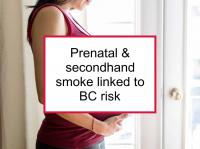Generally speaking, cigarette smoking increases the risk of breast cancer only modestly. However, some circumstances increase risk, including smoking at a young age. Smoking that began before the birth of a woman's first child was associated with an 18% increase in risk for every 20 pack-years smoked in one study.
High cumulative smoking exposure also heightens breast cancer risk. Women who smoked at least one pack per day for 30 years or more had a 28 percent higher risk than nonsmokers in one study.
Latest research finds periods of heightened vulnerability
The large prospective study referenced at the beginning of this news story was designed to investigate the associations between active and passive smoking and breast cancer risk, with an emphasis on exposures during possible periods of increased susceptibility.
The study included 50,884 participants in the Sister Study who were enrolled during the period 2003 to 2009. Sister Study participants were U.S. and Puerto Rican women aged 35 to74 who had a sister with breast cancer.
Data regarding known breast cancer risk factors, as well as active and passive smoking history (including prenatal and childhood exposures), was collected using telephone interviews and paper questionnaires. The women were followed for breast cancer diagnoses for an average of 6.4 years.
A total of 1,843 study participants were diagnosed with invasive breast cancer during the follow-up period. Exposure to second-hand smoke in adulthood was not found to be linked to increased breast cancer risk. However, nonsmoking women who were exposed to second-hand smoke throughout their childhoods were found to have an 18% higher risk of breast cancer than those without any such exposure during childhood.
Prenatal exposure to second-hand smoke was also associated with a modest (16%) increase in breast cancer risk among nonsmokers, as was paternal smoking before the mother's pregnancy (12%). Furthermore, active smoking for at least 10 pack-years prior to first pregnancy was associated with an elevated risk of breast cancer (31%).
The authors conclude that both active and passive smoking during potential windows of breast cancer susceptibility, including the prenatal period, childhood, and prior to first pregnancy, are associated with higher risk.
Please see our articles on protecting our daughters from breast cancer during the prenatal period and infancy and during childhood and puberty for more information.
